|
July 13, 2017
Government Amendments to Canadian
Aviation Regulations
Trudeau Government Abdicates Social
Responsibility for Aviation Safety
- Pierre Chénier -
PDF
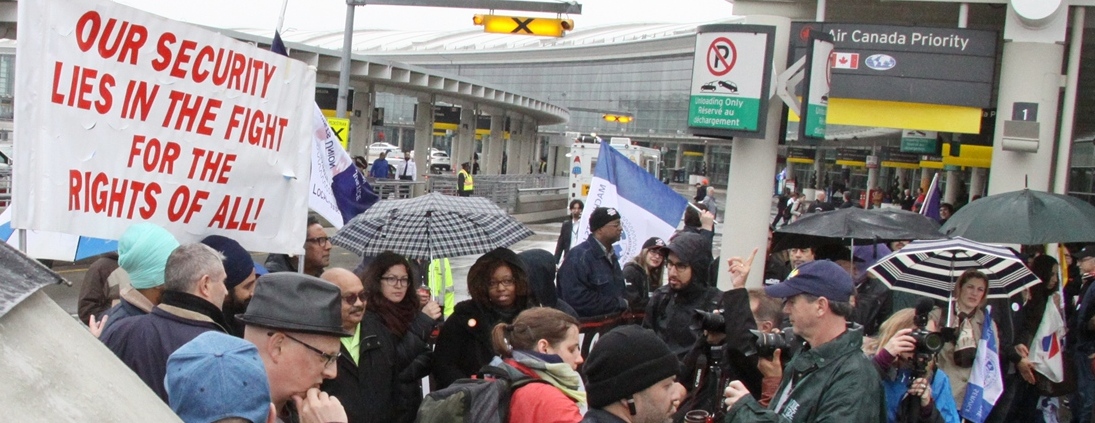
Workers rally, May Day 2017, at Pearson International as part of
airport workers' fight for rights.
Government
Amendments
to
Canadian
Aviation
Regulations
• Trudeau Government Abdicates Social
Responsibility for
Aviation Safety - Pierre
Chénier
• Pilots Severely Criticize Transport Canada's
New Regulations
4th Anniversary of the
Railway Tragedy at Lac-Mégantic
• Lac-Mégantic Residents Demand Railway
Security
Opposition to
Public-Private
Health Care Facilities in Newfoundland-Labrador
• "A Government Is Supposed to Provide Good,
Strong, Wholesome Public Services " - Interview, Wayne Lucas,
President, CUPE Newfoundland and Labrador
Government Amendments to Canadian
Aviation Regulations
Trudeau Government Abdicates
Social Responsibility for Aviation Safety
- Pierre Chénier* -
Federal Minister of Transport Marc Garneau proposed
amendments to the Canadian Aviation Regulations on
June 30. The changes deal with hours of work and rest periods for
flight crews of air carriers operating in Canada. According to the
Minister of Transport, the new regulations are aimed at improving the
safety of
passengers and flight crews. However, even a brief look at the
regulations reveals that the changes do not respond to repeated
requests from pilots for necessary and urgent measures to reduce pilot
fatigue.
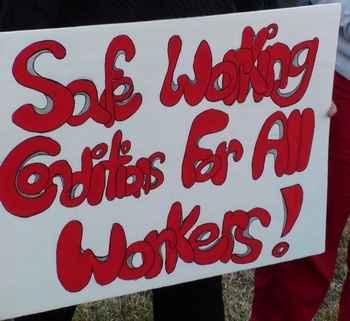
The proposed regulations continue the discredited
system of self-regulation by the air carriers themselves in dealing
with aviation safety. Nowhere is air safety considered to be a
matter of principle that takes precedence over the aims of private air
carriers and restricts what they can do to receive permission to
operate. On the contrary, the
air carriers consider air safety as subordinate to their business
plans,
similar to the companies in the railway sector. The document
accompanying the new regulations repeatedly says that the government
should not impose prescriptive measures on air carriers; otherwise it
will hamper their performance as commercial enterprises.
The Minister of Transport published the proposed
amendments in the Canada Gazette, Part I, on
July 1. The news release states, "Canadians and members
of the industry are encouraged to provide feedback on the draft
regulations until September 29, 2017."
It is striking that the regulations proposed by the
Minister introduce a concept of "fit-for-duty rules" applying only to
workers. The concept of "fit to operate an airline" is nowhere to be
found in the regulations. The communique states that the
proposed amendments include, "New fit-for-duty rules that will prohibit
any flight crew member
from working while they are not fit for duty. This will include
consumption of alcohol or drugs, mental and physical conditions, and
fatigue."
In this regard, the federal government appears more
interested in taking disciplinary action against workers than taking
measures that reduce pilot fatigue and reduce the likelihood of a pilot
contracting a physical or mental illness.
Hours of Work and Fatigue Reduction
According to the Minister of Transport,
consultations with pilots and others on hours of work and their
relationship to fatigue have been ongoing for seven years. It must be
noted that the most recent regulations date back to 1996 and did
not even recognize the issue of time of day, that is to say the effect
on fatigue depending on
whether the flight is in the daytime or night-time.
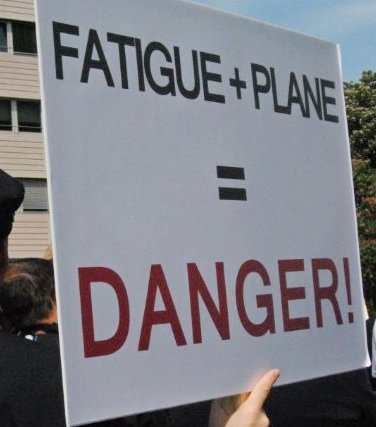
The Minister's proposed changes in hours of work, while
taking night-time into account, do not meet the demands that pilots
have made for years based on scientific studies. The scientists include
those from NASA and even Transport Canada itself. The studies examined
standards established throughout the world and the experience of the
pilots themselves.
The basic demand of the pilots is that for any flight
service commencing after 5:00 pm, the maximum duty period be 10 hours
and the maximum flight time period 8.5 hours. Duty time includes all of
a pilot's duties prior to take-off, the flight time and any post-flight
operations required to complete the service. Flight time is the period
of time when the pilot is actively engaged on the flight deck.
The government's amendments do not change the current regulations in
the sense that they do not specify a limit on maximum flight time
within a day. What they do is reduce flight time over an entire year,
from 1200 hours to 1000 hours per calendar year and give a duty period
of between nine and 13 hours depending on the start time of a pilot's
shift.
These changes are not consistent with the demand of the
pilots who have been very clear in demanding regulations to govern
maximum flight time within daylight and night-time hours for all pilots
regardless of whether they fly small aircraft or work for larger
carriers. The government is proposing company-controlled "fatigue
reduction
regulations" for pilots while opposing the specific demands of those
who are experiencing and documenting this fatigue!
In the typical Trudeau Liberal way, Transport Canada is
claiming that consultations were held with unions and others, but is
forced to recognize that unions are critical of the proposals and is
asking the unions to show a spirit of compromise.
Fatigue Risk Management System
As in the rail sector, the proposed regulation
will incorporate the new measures into fatigue risk management systems
(FRMS) that will empower air carriers to exempt themselves from the
proposed
rules (which are already unacceptable to workers) by developing their
own fatigue management system.
The proposed regulations will provide an opportunity
for air carriers to deviate from prescriptive measures (except the
maximum annual flight time period and maximum annual service time) if,
"they can demonstrate, by way of a safety case, that they can provide
at least the same level of safety as the prescriptive requirements
introduced as
part of this proposal."
The document reads: "For example: an air operator could
be permitted to fly longer than the prescribed flight duty time limit
if they can meet Fatigue Risk Management Systems requirements and show
that alertness and fatigue will not be affected."
The document continues: "The proposal would amend
prescriptive requirements (except for private operators and aerial work
air operators) and introduce an FRMS option to deviate from the
prescriptive requirements for all air transport services in Canada."
|

One of the demands of striking CP railway workers in 2015 was for
proper
rest periods to
prevent fatigue.
|
As in the railway industry, the Ministry of Transport
says it is using a "holistic risk management approach" in opposition to
a prescriptive approach that relies on enforcement of legislation and
regulations.
Pilots are urgently asking for safety measures. They
themselves have defined the most basic one, which is a prescriptive
measure for all pilots on flight time and flight service on evenings
and nights to reverse the current unacceptable situation. In
response, the federal government, always keen to use phrases to mask
what is really going
on, has concocted a holistic fantasy world in which the airline can
"identify hazards; assess risk; develop mitigation strategies; offer
training and education programs; introduce fatigue monitoring systems;
and adopt continual improvement processes to reflect changing
circumstances; and feedback."
The people are to believe that airline workers in all
these years never identified hazards and know nothing about them and
their solutions, which for starters would be specific enforceable
regulations on flight time for pilots.
What will Transport Canada do in all this? The role it
has taken and will continue with these amendments is to put the power
in the hands of the private airlines to regulate themselves
in a manner that serves their narrow private interests. The Ministry
will rubber stamp their reports on safety, if they even bother to read
them, or have
non-scientific personnel in human resources read them. The Canada
Gazette document is very clear about continuing the policy of no
restrictions on airlines and enforcement: "There will be zero
administrative cost to the Government of Canada, since Transport Canada
does not intend to approve the FRMS. Instead, Transport Canada would
require the air operators to notify Transport Canada by means of a
notice of intent and a letter of confirmation that they would be using
an FRMS to manage pilot flight duty periods. Only upon request, the air
operator would have to submit documentation describing their system, a
safety case supporting the proposed deviation(s) and a year's
worth of data to support their suggested flight schedules. Transport
Canada regional inspectors would assist to administrate the process as
part of their day-to-day activities, which would simply be added to the
inspection schedule at no additional cost to the Government."
And if that is not clear enough, it adds:
"The regulatory administration cost associated with the
aforementioned activities would be negligible. The assessment process
is expected to be part of the responsibilities of existing resources.
Preliminary assessment also concluded that hiring additional personnel
would not be required. Therefore, there would be no overall incremental
regulatory administration."
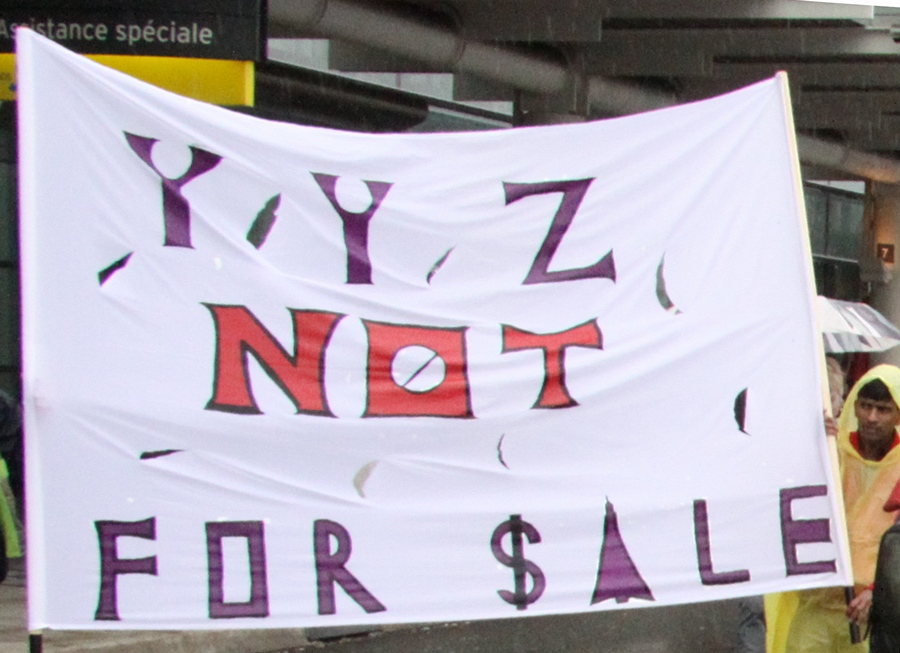 Transport Canada inspectors
are described not as worker
and passenger safety advocates and front-line interveners with the
power to stop an operation if it is not safe, but as detached readers
of
company reports. In this way the federal government adds reading of
company reports to the responsibilities of the inspectors without
having to modify
the existing resources and heaven forbid increase costs to enforce
safety regulations. The already insufficient resources of the Transport
Ministry will be used to prettify the retrogressive concept that the
private transportation oligopolies are those who know best what is good
for safety and wish to incorporate safety into their "operating costs"
to
remain competitive in the global air transport market. Transport Canada inspectors
are described not as worker
and passenger safety advocates and front-line interveners with the
power to stop an operation if it is not safe, but as detached readers
of
company reports. In this way the federal government adds reading of
company reports to the responsibilities of the inspectors without
having to modify
the existing resources and heaven forbid increase costs to enforce
safety regulations. The already insufficient resources of the Transport
Ministry will be used to prettify the retrogressive concept that the
private transportation oligopolies are those who know best what is good
for safety and wish to incorporate safety into their "operating costs"
to
remain competitive in the global air transport market.
The safety of workers and passengers is not considered
a principle that gives rise to restrictive measures by the state on the
ability of private monopolies to do as they please to suit their aim
of private profit at the expense of the well-being of all. Safety
measures are turned into hollow policy statements that have no teeth
except to attack the
workers themselves and make them scapegoats when disasters occur.
The Workers' Centre of CPC(M-L) fully supports the
fight
of the pilots to defend their safety and the safety of passengers and
communities. It also lends its voice to the fight of all
transportation workers against the degrading of their working
conditions, the privatization of Canada's transportation systems and
weakening of state restrictions on the monopolies that may serve the
common good.
* Pierre Chénier is
Secretary of the Workers' Centre of CPC(M-L).

Pilots Severely Criticize Transport Canada's
New Regulations

Click to enlarge.
As part of their Safer Skies campaign to urge
Transport Minister Marc Garneau to introduce stricter rules on airline
safety, pilots' organizations are criticizing the new regulations that
Transport Canada announced on June 30.
In
a
July
4
release,
the
pilots'
unions declare that the changes posited
by Transport Canada are well below what scientists propose in terms of
fatigue reduction, including scientists working for NASA and Transport
Canada itself. The recommendation of the scientists, the unions say, is
to limit the duty time of pilots starting work after 5:00 pm to 10
hours, which amounts to 8.5 hours of flight time. Duty time includes
pre-flight duties, flight time and post-flight operations. Pilots are
calling for these limits to be put in place and enforced by Transport
Canada.
Not
only
does
the
new
Transport
Canada
regulation not take into account
pilots' demands on the regulation of flight time and duty time at
night, but, the unions state, "The new maximum allowable time for long
haul flights at night far exceeds the hours recommended for pilots by
NASA's Ames Research Center by up to 25 per cent."
The pilots also criticize the proposals for
implementation because they create a division amongst pilots, their
passengers, and the communities they serve. They point out that pilots
flying smaller aircraft will have to wait a full four years to be
protected by the meagre measures Transport Canada is proposing while
implementation for the pilots
of the larger carriers is 12 months.
Pilots also criticize the fact that the rules are based
on a fatigue risk management system (FRMS). This system does not rely
on
science-based prescriptive limits or even independent verification and
approval, and supervision by Transport Canada. The FRMS allows carriers
to exempt themselves from rules
according to their
own business plan and considerations, rules that are already deemed
unacceptable to pilots. According to the pilots' unions, "This will
allow operators to place commercial considerations ahead of safety
concerns, thereby creating an unacceptably low margin of safety for
Canadian air passengers and for those communities and neighbourhoods
near
airports."
Petition on Fatigue Reduction
In April 2017, unions representing
Canadian pilots began circulating a petition calling for Transport
Canada to adopt specific measures to reduce the fatigue experienced by
pilots. The petition is addressed to the Minister of Transport and can
be signed online here.
The petition reads:
"Petition to the Minister of Transport
"Whereas:
"Canada's commercial pilots play an essential role in
safeguarding their passengers, crew and the public;
"Scientific research has established that fatigue
impairs cognitive ability and performance for all -- including pilots;
"Other jurisdictions, including the U.S., have updated
pilot fatigue rules to manage the risk of fatigue;
"Canada's current pilot fatigue rules are more
than 20 years out of date;
"The government's proposed updates to Canada's pilot
fatigue rules do not adequately align with fatigue science, especially
for long-haul night flights, or with limits established in other
jurisdictions; and
"The proposed fatigue rules would permit air operators
to bypass these fatigue limits by introducing weak Fatigue Risk
Management System (FRMS) provisions that lack adequate regulatory
oversight, pilot input, and enforcement provisions.
"We, the undersigned, residents of Canada, call upon
the Minister of Transport to protect the safety of passengers, flight
crews and the public by amending the proposed flight crew fatigue
management regulations to:
"1. Afford pilots and passengers of all sizes of
aircraft -- whether they carry passengers or cargo -- the same
protective fatigue limits, coming into force at the same time;
"2. Address pilot fatigue on long-haul flights at night
by limiting duty periods that begin after 1700h to 10 hours
(or 8.5 hours of flight time) -- in line with NASA research
findings; and
"3. Ensure that any FRMS relies on science-based
prescriptive limits as a foundation, requiring independently verifiable
data and stringent Transport Canada approval and oversight."
The Safer Skies campaign is supported by
Canada's largest pilot groups: the Air Canada Pilots Association; the
Air Line Pilots Association International; Unifor; Teamsters Canada;
the International Association of Machinists and Aerospace Workers and
the Office and Professional Employees International Union.
For more information on the campaign, visit www.SaferSkies.ca

4th Anniversary of the Railway Tragedy at
Lac-Mégantic
Lac-Mégantic Residents Demand Railway Security

July 6, 2017 marks the fourth anniversary of the
railway
tragedy at Lac-Mégantic. The disaster killed 47 people,
destroyed the downtown area, and contaminated the surrounding land as
well as the Chaudière River. On the sombre occasion, the
Coalition of Citizens and Organizations for Railway Safety held a press
conference near the
railway tracks where the derailment took place. The Coalition demanded
the Federal and Quebec governments take immediate action on railway
safety beginning with the building of a bypass route around
Lac-Mégantic so that dangerous products, especially crude oil,
no longer travel through the town. The Coalition forcefully declared
that
railway
safety must be at the heart of all economic development affecting the
town and surrounding region and that the people living there should
have a say on these developments.
 The Coalition denounced,
among other things, that instead of building a bypass the railway
section where the train
convoy derailed was rebuilt days after the tragedy with an eight degree
curve, even
more pronounced than the original one of four
degrees. This makes the route even more dangerous in terms of a
possible derailment. This information was
revealed to residents only this past May during hearings of the
Bureau d'Audiences Publiques sur l'Environnement on the social
acceptability of various railway options following the tragedy. The Coalition denounced,
among other things, that instead of building a bypass the railway
section where the train
convoy derailed was rebuilt days after the tragedy with an eight degree
curve, even
more pronounced than the original one of four
degrees. This makes the route even more dangerous in terms of a
possible derailment. This information was
revealed to residents only this past May during hearings of the
Bureau d'Audiences Publiques sur l'Environnement on the social
acceptability of various railway options following the tragedy.
The rebuilt line has been in use since
January 2014 for
the weekly passage of over ten convoys belonging to the Central Maine
and Quebec Railway company, which purchased the assets of the
bankrupt Montreal, Maine and Atlantic Railway, the operator of the
train that derailed and exploded on that tragic night four years
ago. The
Central Maine and Quebec Railway regularly transports tank cars
through downtown Lac-Mégantic. Similar to before that fateful
night, the tanks are filled with dangerous substances such as propane
gas, sulfuric acid and gasoline containing ethanol. The
transportation of crude oil is expected to resume in 2018. Without
a
bypass, the
Coalition demands at the very least that the curve in the railway where
the derailment took place be reduced to the minimum.
The Coalition also raises another risk factor concerning
the sorting
out of the content of the freight cars. Presently, this is done on the
service track at the height of the slope, which descends non-stop into
the downtown. Any problem with handling of the freight and in
connecting to the main track could lead to a train heading off on its
own
down the steep slope. The fact that the service track is being used for
freight handling also means that trains are still being parked on the
main track and not the service track, which is what happened on the
night of July 6, 2013 when the parked train full of crude oil
raced
down the slope on its own, derailed and exploded. The
Coalition demands that corrective action be taken on these matters.
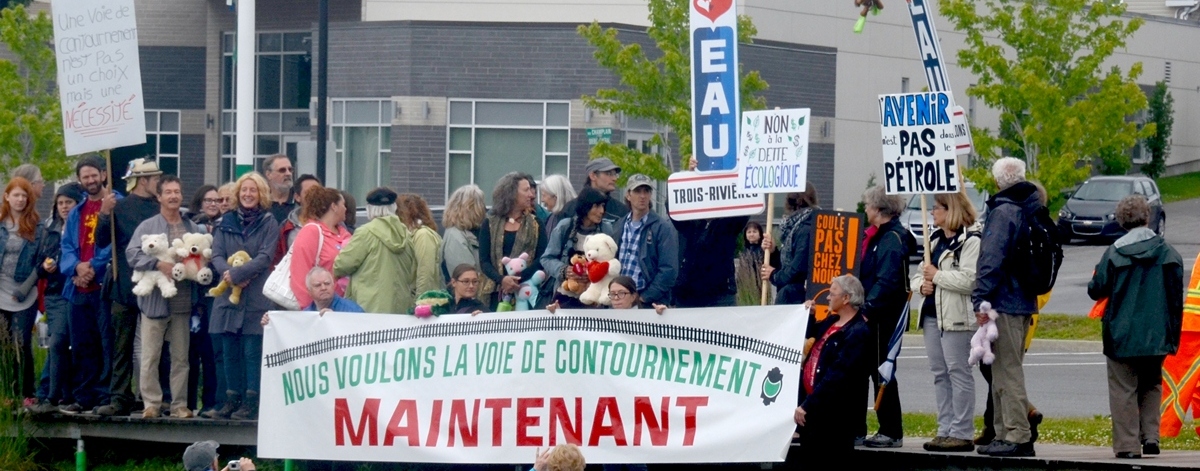
Rally, July 10, 2016, marked the 3rd anniversary of the
Lac-Mégantic
train disaster.
As for the bypass route, the Coalition denounces as
unacceptable the lack of action by governments, which claim further
studies
are necessary and then use this as an excuse not to propose any time
frame for construction to begin. The Coalition reports that the City
Council of the neighbouring municipalities including Nantes and
Frontenac have
reached an agreement with the town of Lac-Mégantic on a modified
bypass route that is considered safe. The proposed route would minimize
passage through farm and forestry land. The farm and forestry producers
affected by the
bypass have said they would agree to the proposed route in exchange for
financial compensation. The Coalition
claims that the only factor missing for construction to begin is the
political will of the federal and Quebec governments to make it happen!
The lack of urgency by governments puts additional stress on
residents who have suffered so greatly and demand their safety be the
main consideration in the operation of the railway.
On the occasion of the 4th anniversary of this
tragedy, Workers' Forum
extends its support to the people of Lac-Mégantic and the region
who are fighting to have their voices heard. Their rights, safety and
well-being must be at the heart of all measures to revitalize the town
and economy and provide a future for those who have endured such a
calamity.

Opposition to Public-Private Health Care
Facilities
in Newfoundland-Labrador
"A Government Is Supposed to Provide Good,
Strong,
Wholesome Public Services "
- Interview, Wayne Lucas, President, CUPE
Newfoundland and Labrador -
 
CUPE Rally against privatization of Health Care in St. John's, July 11,
2017.
Workers' Forum: The
Canadian
Union
of
Public
Employees,
Newfoundland
and
Labrador
held a
rally on July 11 in St.
John's to mobilize people against what you call public-private
partnerships (P3s) -- Trojan Horse of
Liberal health care. This is part of a campaign you are planning to
wage across the province. What is the aim of the
campaign?
Wayne Lucas: Like the Trojan Horse
at the time of the Trojan War, the P3s are promised by the government
of Newfoundland-Labrador as a gift to the people but you have to be
aware of the gift you receive. Sometimes, they are not what they seem
to be. During the Trojan War, the Trojan Horse was sent by the Greeks
to
the city of Troy. After 10 years of war, they gave them the gift
of a hollow wooden horse. Inside the horse there were 30 Greek
soldiers and the Greeks gave the impression they were sailing
back to their country. The people of Troy were happy that this was a
gift terminating the war and they took the horse inside the gates of
the great wall. While the people of Troy were sleeping, the soldiers
crept out of the horse and opened the gates and the rest of the Greek
soldiers came back and that was the end of Troy.
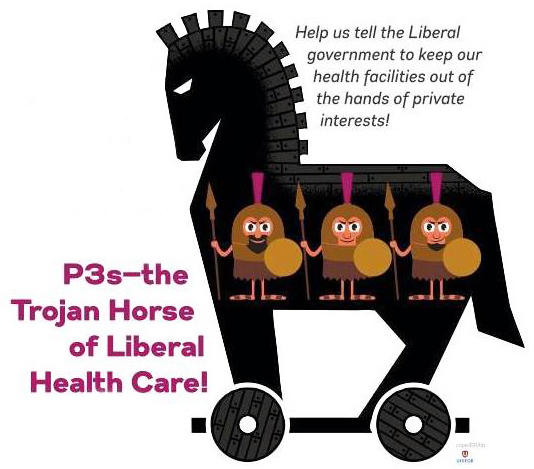 This government says that
the P3 projects are a gift to the people but it has been proven beyond
the shadow of a doubt that P3s benefit one
group of people, the big business interests and the wealthy of society,
to the detriment of the people inside long-term care hospitals and
of course the employees. So we have
a 15-foot hollow Trojan Horse that we want to bring around the
various communities to tell the people that this government is trying
to hoodwink us. We vow to reach every community we can and educate
people that what happened with the Trojan horse, that was supposed to
be a gift to the people and was the downfall of Troy, in the
same way it will be bankruptcy for Newfoundland-Labrador. This government says that
the P3 projects are a gift to the people but it has been proven beyond
the shadow of a doubt that P3s benefit one
group of people, the big business interests and the wealthy of society,
to the detriment of the people inside long-term care hospitals and
of course the employees. So we have
a 15-foot hollow Trojan Horse that we want to bring around the
various communities to tell the people that this government is trying
to hoodwink us. We vow to reach every community we can and educate
people that what happened with the Trojan horse, that was supposed to
be a gift to the people and was the downfall of Troy, in the
same way it will be bankruptcy for Newfoundland-Labrador.
The Liberal government has plans for two new health
care facilities in Corner Brook as P3 facilities, a long-term care home
and a new regional hospital. Because CUPE and other unions have been
protesting for years, the government is saying to the people that they
have nothing to worry about, that they understand this concern about
P3s,
that these facilities are going to be publicly run with public
employees. We are saying to the people not to fall for that either. In
North Bay for example, the people were told the same thing. Years
later, there have been three rounds of cuts, beds have closed,
employee's jobs have been in jeopardy and the thirst for profit just
trumps everything
else. The reason is that the enterpreneurs' responsibility is to their
shareholders, to make sure that they maximize the profit they can make
for their shareholders.
In Newfoundland, we also have got the experience over
the last 60-70 years of being in Confederation that usually
business interests trump the interests of ordinary Newfoundlanders
and Labradorians, of employees and the general public.
We also say that here is a government that is
unapologetic in saying that it does not want to govern. A government is
supposed to provide good, strong, wholesome public services.
Governments are elected to provide the [public with] services, not to
serve their
masters, not to serve profit makers. They are not listening to the
evidence we provided, to
the Ontario situation where the P3 experience has been a real disaster.
If we move in this direction, in 10-15 years from
now, everything is going to be privatized. The government is actually
saying that they are looking at all options -- anywhere there is
public service they want to privatize; they are saying that
privatization is a better system, that it is cheaper. This is not true.
It may look true in the first
couple of years because they can hide the money on the books, but when
Auditor Generals get invoved in five to ten years time they discover
just like in Ontario that there are cost overruns in the billions of
dollars.
WF: How did the rally go in
St. John's and are you planning other actions this summer?
WL: The rally was very good.
We had about 60 people. We rallied first at Glenbrook Lodge which
is part of CUPE Local 879, then marched for a while on the
sidewalk until we came to an intersection where there was less traffic.
We brought the horse into the streets and marched behind the horse.
We
ended up in a beautiful park, and we had speakers
from the NDP and labour who were highly critical of any type of
implementation of P3 projects. The spirit was good, the membership was
upbeat, people were saying that we have to keep up the fight, that we
are not going to let down the next generation.
We are planning to organize a few more actions in St.
John's and then get to the west coast of Newfoundland, certainly to
Corner Brook, go to the sites where the new facilities are supposed to
be built and then go to other cities.

PREVIOUS
ISSUES | HOME
Website: www.cpcml.ca
Email: office@cpcml.ca
|






 The Coalition denounced,
among other things, that instead of building a bypass the railway
section where the train
convoy derailed was rebuilt days after the tragedy with an eight degree
curve, even
more pronounced than the original one of four
degrees. This makes the route even more dangerous in terms of a
possible derailment. This information was
revealed to residents only this past May during hearings of the
Bureau d'Audiences Publiques sur l'Environnement on the social
acceptability of various railway options following the tragedy.
The Coalition denounced,
among other things, that instead of building a bypass the railway
section where the train
convoy derailed was rebuilt days after the tragedy with an eight degree
curve, even
more pronounced than the original one of four
degrees. This makes the route even more dangerous in terms of a
possible derailment. This information was
revealed to residents only this past May during hearings of the
Bureau d'Audiences Publiques sur l'Environnement on the social
acceptability of various railway options following the tragedy. 


 This government says that
the P3 projects are a gift to the people but it has been proven beyond
the shadow of a doubt that P3s benefit one
group of people, the big business interests and the wealthy of society,
to the detriment of the people inside long-term care hospitals and
of course the employees. So we have
a 15-foot hollow Trojan Horse that we want to bring around the
various communities to tell the people that this government is trying
to hoodwink us. We vow to reach every community we can and educate
people that what happened with the Trojan horse, that was supposed to
be a gift to the people and was the downfall of Troy, in the
same way it will be bankruptcy for Newfoundland-Labrador.
This government says that
the P3 projects are a gift to the people but it has been proven beyond
the shadow of a doubt that P3s benefit one
group of people, the big business interests and the wealthy of society,
to the detriment of the people inside long-term care hospitals and
of course the employees. So we have
a 15-foot hollow Trojan Horse that we want to bring around the
various communities to tell the people that this government is trying
to hoodwink us. We vow to reach every community we can and educate
people that what happened with the Trojan horse, that was supposed to
be a gift to the people and was the downfall of Troy, in the
same way it will be bankruptcy for Newfoundland-Labrador.